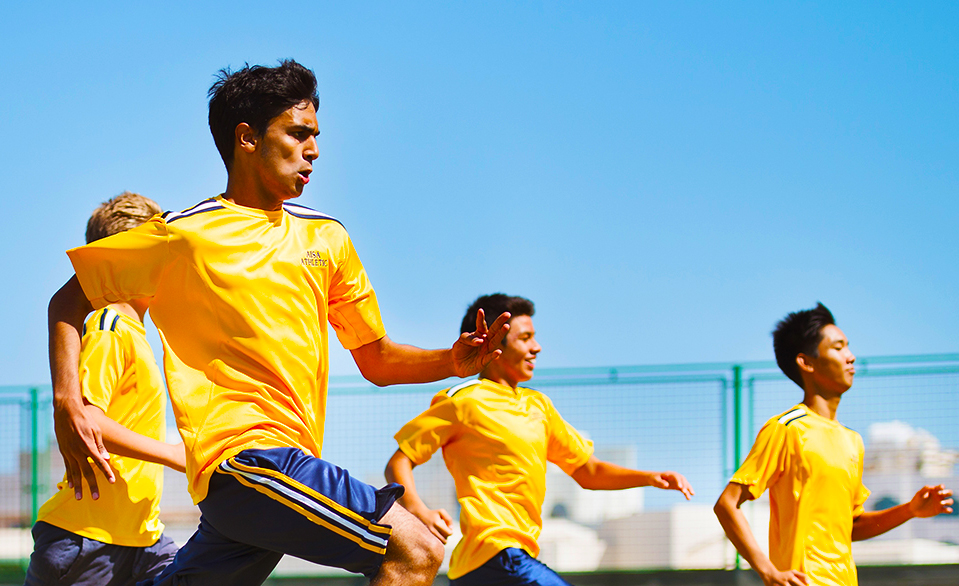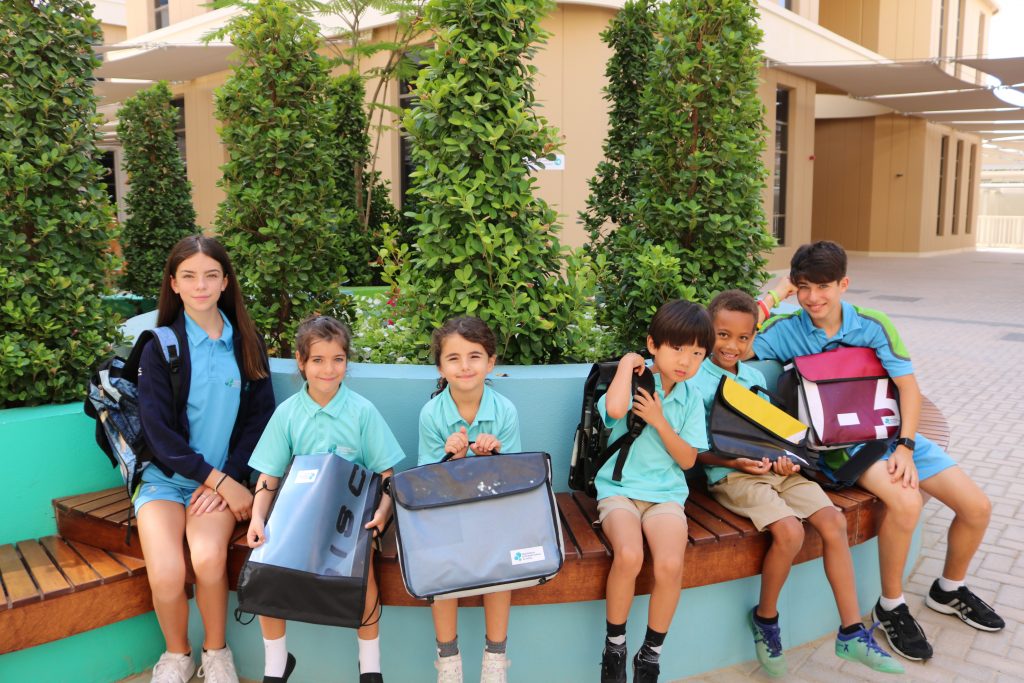Background – Sport at Fairgreen International Goes Premier League with Functional Movement UAE Schools First for The Beautiful Game…
and not just in football.
In fact, the new Functional Movement system, one pretty much a standard in pro sports training globally, is to be used throughout the Sport curriculum at Fairgreen International School.
The aim? To deliver on all the potential of all, not only the most gifted, children in Sport – but also to ensure that every child engaging in Sport at Fairgreen international School does so with the highest available standards of safety.
Functional Movement Systems (in the industry known as FMS), may sound like another acronym thrown at a problem that did not need solving – but the issue of safety in school sport is one that deeply concerns many parents.
It’s difficult to come up with accurate statistics for child sporting injuries in the UAE, but US data does give us some sort of approximate insight.
In the United States, around 30 million children and teenagers participate in some form of organized sport. The result? More than 3.5 million injuries each year. On average this means that around 1 in 10 children in schools can expect to receive some sort of injury. In total, around a third of all childhood sports injuries come from sporting-related activities. Whilst rare, the leading cause of death from a sports-related injury is a brain injury. In the US, sports and recreational activities contribute to approximately 21 percent of all traumatic brain injuries among children.
Contact sports, including football and rugby, result in a higher number of injuries than a non-contact sports, including swimming. However, all types of sports can potentially injure children if they are not physically ready for the individual demands of the sport. Interestingly, the majority of sports-related injuries (around 60 percent) occur during practice. About 88,000 children ages 5 to 14 each year are treated in hospital emergency rooms for football-related injuries.
A similar picture is true in the UK.
In the UK, children up to the age of 19 years account for almost half of all sports injury-related emergency department attendances and almost one-quarter of sports injury-related admissions for all ages. The highest rates of attendance occurs at around 14 years for boys and 12 years for girls . For boys, the biggest risks are in football, rugby union and rugby league – and for girls, trampoline, netball and horse-riding. Around one-quarter of emergency department sports-related injuries are for fractures.
The issue is a live and divisive one, with calls ongoing, for example, for tacking in rugby to be banned in schools because of the risk of brain damage. On a personal note, the Editor went to school with a child who was permanently paralysed from a collapsed scrum in rugby. It is rare, but it happens – and if you are the parent of an injured child, nothing is more important.
This is, for us, just one element in the background to what we believe is a very creditable investment by Fairgreen International School Dubai in the safety of all children at its school playing sport. It’s also a key driver for the investment made in FMS by professional sporting bodies globally, whether in the premiership, or any number of other sporting disciplines including the NFL and NBA in the US. It’s also used by the US military. It’s serious stuff.
So what exactly is Functional Movement?
As with many initiatives in Sport, descriptions are in our view unnecessarily obtuse and replete with jargon and pseudo-Science. The partners of Fairgreen in the UK, the respected FMS UK, could surely do more to speak to parents about the benefits to children of their programmes in a way that better brings these to life. This said, the bottom line of what is actually being delivered by them is hugely creditable and important. We think FMS benefits can be more inspirationally summarised as follows:
(1) Ensuring that every child can engage in sport at an appropriate safe level that is relevant to their fitness.
(2) Ensure that children can develop their skills in Sport to their maximum potential.
(3) Engage and inspire more children to enjoy sport because activities are perfectly matched to individuals needs and stages of development.
In even more meaningful terms, what the UAE first investment by Fairgreen International in FMS should achieve are really important things for students and families:
(1) Getting more children engaged in sport – this absolutely vital for child health. We all know as parents the risks of obesity, but physical fitness during childhood has consistently been shown to contribute significantly to the health of adults later across all parts of our lives.
(2) Ensuring as far as possible children do not get injured because sporting engagement is matched to each stage of a child’s journey much better.
(3) The most gifted in children in Sport will understand better their limits and be able to plan best for tackling these safely over time.
(4) Providing teachers with new tools to understand where each child’s individuals gifts in Sport may lie – and so steer children in the direction of those sports in which they will be able to make the biggest impact.
How does FMS in Sport achieve these things?
Traditionally, if simplistically, children are assessed by teachers in sport, often simply visually in terms of performance, and then divided up according to ability. Decisions are often based on obvious proficiency rather than potential, which on the surface is much more difficult to measure. Inevitably, this results, to some degree, in the age old issue which divides children between sporty types and “also rans” – with many children being put off sport for life – something in no one’s interests.
FMS provides a model for assessing children using seven movement tests that each require a varying balance of mobility and stability. The system provides a similar structure to assessing each child’s potential and ability at a given time, to that used in academic subjects. By introducing a system in sport, each child’s improvement can be measured – in an equivalent sort of way to that of flight paths used for measuring academic attainment. The end result is that, in Sport, with this system in place, no child at Fairgren International School, in Sport, should ever be left behind their peers.
Parents too gain a way of understanding much better how their children are fairing in Sport. The system comes with an app, accessible by children and parents, that shows how their child is developing and the various training programmes put in place to help each child.
This surely is to be welcomed. Even today, the most many parents come to understanding the development of their child is through Sports Days, rather than through well structured, measurable data over time.
Bottom line? The SchoolsCompared.com Verdict on Functional Movement in Sport at Fairground School.
It’s early days for a system that will roll-out at Fairgreen International from September 2021. Fairgreen will pilot the “Movement Patterns” programme first among students in Grades 3-5, before rolling it out to all students in Grades 3-12. The programme will provide all students with a personalised development pathway in Sport that inspires them – and informs parents and educators.
“By developing correct movement habits in their formative years, students will have a more positive association with physical activity. This will fundamentally improve each child’s self-confidence – and ultimately set them on a more active path for the rest of their lives.
At Fairgreen International School in Dubai, student wellbeing is at the absolute heart of everything we do.
By working with the UK based FMS team and their fantastic screening programme, we will be better able to support our students’ physical wellbeing – and prepare them to move more regularly, with confidence.
Our students will develop a legacy of physical wellbeing that will have a long-term positive impact on all their lives.”
Daniel Walker. Athletics Director. Fairgreen International School Dubai.
But for us, any initiative that is built around inspiring the very best from all children in sport is something we should celebrate. We like to see schools investing in sport beyond the obvious bells and whistles of facilities and the showy appearances of First Teams – these are relatively easy wins. Not all children are sporty – but it is far too an important area of the curriculum for investment to be showered on the headline relatively gifted few.
Parents too will appreciate anything that improves the safety of sport in schools. No parents wants their child to be hurt. But parents, too, value sport and all the many gifts it brings for children enormously. FMS helps get the balance of ability to activity level so much more finely tuned for every child. Safety evolves from this. Putting children in positions where they can be hurt because they do not have the required level of agility or fitness should become a thing of the past with this programme.
So too, because all children will be involved in the programme, sport becomes much more, democratised and so inspiring to more children.
The ability for every child (with their parents) to monitor their progress over time cannot but help drive up giftedness – and every child’s ability to develop according to their own level of potential. Every success gained by each child on their own personal journey, now as valuable and creditable as the different achievements of other children – will now be more measurable, and so celebrated, by the school and Fairgreen’s many talented teachers of sport. Personalised learning and development is very much the future of education – and it is so impressive to see this now more easily accessible in Sport.
Finally, the skills and measurement introduced by FMS are applicable across the whole sporting curriculum including ECAs like ballet, Judo and Gymnastics at Fairgreen.
Bottom line? Huge credit to Fairgreen International School for this investment in the sporting welfare and potential of children. Sometimes, it is the less obvious more low key investments made by a school that really count – rather than the easy shiny baubles of bells and whistles. This is very much one of those. We watch with interest and will report back on the many positive impacts we expect next year as the new programme finds its very welcome feet. In the meantime – parents will be cheering from the side-lines for a school that is very transparently and creditably putting inspiration, safety and achievement in sport within reach of every single child – and each at the very heart of the sporting curriculum.
Click here to read our independent review for parents of Fairgreen International School in Dubai.
Click here to visit the official web site of Fairgreen International School.
Click here to visit the web site of FMS UK.
© SchoolsCompared.com. 2021. All rights reserved.




































































Leave a Response